Canada and Taiwan signed a memorandum of understanding this month on sharing data regarding illegal fishing vessels, which could help the country track covert Chinese maritime activity, Canadian newspaper the Globe and Mail reported yesterday.
The Dark Vessel Detection (DVD) technology uses satellites to locate and track vessels, sometimes called “dark ships,” that have turned off their automatic identification system (AIS) transponders, or location-transmitting devices, it said.
This is part of a “blossoming” relationship between the two sides, the newspaper said, despite the lack of formal diplomatic relations between them and Canada’s traditional caution about engaging on security matters with Taiwan.

Photo courtesy of the Coast Guard Administration
In November, the Canadian government stationed a cybersecurity expert in Taipei to deepen cybersecurity cooperation between the two sides and respond to hacking and disinformation threats from China, the outlet said.
The agreement was brokered by Jim Nickel before he left his role as executive director of the Canadian Trade Office in Taipei last month, it reported.
Taiwan is Canada’s third international partner using the technology, after the Philippines and Ecuador, it said.
In a statement on X, Canada’s Department of Fisheries and Oceans said the country would provide Taiwan training and access to the DVD platform for two years.
The report quoted Vina Nadjibulla, vice-president of research and strategy at the Asia Pacific Foundation, a Canadian think tank, who called the DVD program “one of the biggest success stories of Ottawa’s Indo-Pacific strategy.”
It is part of Canada’s attempts to expand its role and engagement in the region, it said.
“It is sold as something that deals with illegal, unreported and unregulated fishing, but it can also detect dark vessels that are engaged in all sorts of other activities, so anything from drug trafficking to undermining subsea cables and other kinds of infrastructure threats – grey zone tactics that China and other authoritarian actors are involved in,” Nadjibulla told the newspaper.
Vietnam and Indonesia have also expressed interest in the technology, Nadjibulla said.
China’s fishing fleet is the largest in the world and has been accused of illegal fishing, it said.
In June, the Coast Guard Administration said that in the first six months of the year it chased off 31 illegal fishing boats 111 times around just the Pratas Islands (Dongsha Islands, 東沙群島).
This year has also seen several cases of Chinese vessels suspected of intentionally damaging submarine cables around Taiwan.
Both Taipei and Ottawa declined to comment on the prospect of Taipei using this to protect the territory’s Kinmen and Matsu Islands from coercive behavior by Chinese ships, the report said.
Canada’s Department of Fisheries and Oceans spokesman Craig Macartney was quoted as saying that the collaboration “will help Taiwan better monitor maritime activity and vessel movements, including their own fleets, leading to more effective and targeted enforcement actions” against fishing misconduct.
Taiwan’s Representative to Canada Harry Tseng (曾厚仁) was quoted as saying that the pact with Ottawa “highlights the shared commitment to peace and stability in the Indo-Pacific region.”

Taiwan has received more than US$70 million in royalties as of the end of last year from developing the F-16V jet as countries worldwide purchase or upgrade to this popular model, government and military officials said on Saturday. Taiwan funded the development of the F-16V jet and ended up the sole investor as other countries withdrew from the program. Now the F-16V is increasingly popular and countries must pay Taiwan a percentage in royalties when they purchase new F-16V aircraft or upgrade older F-16 models. The next five years are expected to be the peak for these royalties, with Taiwan potentially earning

STAY IN YOUR LANE: As the US and Israel attack Iran, the ministry has warned China not to overstep by including Taiwanese citizens in its evacuation orders The Ministry of Foreign Affairs (MOFA) yesterday rebuked a statement by China’s embassy in Israel that it would evacuate Taiwanese holders of Chinese travel documents from Israel amid the latter’s escalating conflict with Iran. Tensions have risen across the Middle East in the wake of US and Israeli airstrikes on Iran beginning Saturday. China subsequently issued an evacuation notice for its citizens. In a news release, the Chinese embassy in Israel said holders of “Taiwan compatriot permits (台胞證)” issued to Taiwanese nationals by Chinese authorities for travel to China — could register for evacuation to Egypt. In Taipei, the ministry yesterday said Taiwan

‘LIKE-MINDED PARTNER’: Tako van Popta said it would be inappropriate to delay signing the deal with Taiwan because of China, adding he would promote the issue Canadian senators have stressed Taiwan’s importance for international trade and expressed enthusiasm for ensuring the Taiwan-Canada trade cooperation framework agreement is implemented this year. Representative to Canada Harry Tseng (曾厚仁) in an interview with the Central News Agency (CNA) said he was increasingly uneasy about Ottawa’s delays in signing the agreement, especially as Ottawa has warmed toward Beijing. There are “no negotiations left. Not only [is it] initialed, we have three versions of the text ready: English, French and Mandarin,” Tseng said. “That tells you how close we are to the final signature.” Tseng said that he hoped Canadian Prime Minister Mark Carney

POSITIVE DEVELOPMENT: Japan and the US are expected to hold in-depth discussions on Taiwan-related issues during the meeting next month, Japanese sources said The holding of a Japan-US leaders’ meeting ahead of US President Donald Trump’s visit to China is positive news for Taiwan, former Japan-Taiwan Exchange Association representative Hiroyasu Izumi said yesterday. After the Liberal Democratic Party’s landslide victory in Japan’s House of Representatives election, Japanese Prime Minister Sanae Takaichi is scheduled to visit the US next month, where she is to meet with Trump ahead of the US president’s planned visit to China from March 31 to April 2 for a meeting with Chinese President Xi Jinping (習近平). Japan and the US are expected to hold in-depth discussions on Taiwan-related issues during the